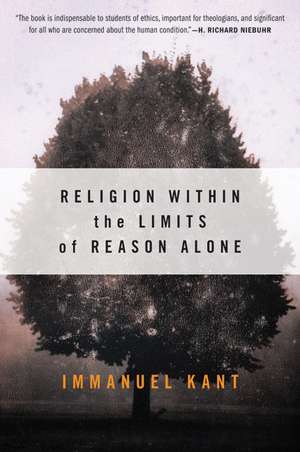Religion Within the Limits of Reason Alone: Torchbooks
Autor Immanuel Kanten Limba Engleză Paperback – 4 aug 2008
A Monumental Figure of Western Thought Wrestles with the Question of GodImmanuel Kant (1724-1804) is one of the most influential philosophers in the history of Western philosophy. His contributions have had a profound impact on almost every philosophical movement that followed him.
Kant's teachings on religion were unorthodox in that they were based on rationality rather than revelation. Though logically proving God's existence might be impossible, it is morally reasonable to "act as if there be a God." His strictly rational approach was considered so scandalous that the King of Prussia forbid him to teach or write further on religious subjects, which Kant obeyed until the king's death.
A work of major importance in the history of Western religious thought, Religion Within the Limits of Reason Alone represents a great philosopher's attempt to spell out the form and content of a type of religion grounded in moral reason and meeting the needs of an ethical life.
Preț: 108.51 lei
Nou
Puncte Express: 163
Preț estimativ în valută:
20.77€ • 21.45$ • 17.28£
20.77€ • 21.45$ • 17.28£
Carte disponibilă
Livrare economică 04-18 martie
Livrare express 18-22 februarie pentru 23.09 lei
Preluare comenzi: 021 569.72.76
Specificații
ISBN-13: 9780061300677
ISBN-10: 0061300675
Pagini: 352
Dimensiuni: 135 x 203 x 20 mm
Greutate: 0.32 kg
Editura: HarperCollins Publishers
Colecția HarperOne
Seria Torchbooks
ISBN-10: 0061300675
Pagini: 352
Dimensiuni: 135 x 203 x 20 mm
Greutate: 0.32 kg
Editura: HarperCollins Publishers
Colecția HarperOne
Seria Torchbooks
Notă biografică
Immanuel Kant ( 22 April 1724 - 12 February 1804) was an influential German philosopher[23] in the Age of Enlightenment. In his doctrine of transcendental idealism, he argued that space, time, and causation are mere sensibilities; "things-in-themselves" exist, but their nature is unknowable.[24][25] In his view, the mind shapes and structures experience, with all human experience sharing certain structural features. In one of his major works, the Critique of Pure Reason (1781; second edition 1787),[26] he drew a parallel to the Copernican revolution in his proposition that worldly objects can be intuited a priori ('beforehand'), and that intuition is therefore independent from objective reality.[b]
Kant believed that reason is also the source of morality, and that aesthetics arise from a faculty of disinterested judgment. Kant's views continue to have a major influence on contemporary philosophy, especially the fields of epistemology, ethics, political theory, and post-modern aesthetics. He attempted to explain the relationship between reason and human experience and to move beyond the failures of traditional philosophy and metaphysics. He wanted to put an end to what he saw as an era of futile and speculative theories of human experience, while resisting the skepticism of thinkers such as David Hume. He regarded himself as showing the way past the impasse between rationalists and empiricists,[28] and is widely held to have synthesized both traditions in his thought.[29]
Kant was an exponent of the idea that perpetual peace could be secured through universal democracy and international cooperation. He believed that this would be the eventual outcome of universal history, although it is not rationally planned.[30] The nature of Kant's religious ideas continues to be the subject of philosophical dispute, with viewpoints ranging from the impression that he was an initial advocate of atheism who at some point developed an ontological argument for God, to more critical treatments epitomized by Schopenhauer, who criticized the imperative form of Kantian ethics as "theological morals" and the "Mosaic Decalogue in disguise",[31] and Nietzsche, who claimed that Kant had "theologian blood"[32] and was merely a sophisticated apologist for traditional Christian faith

